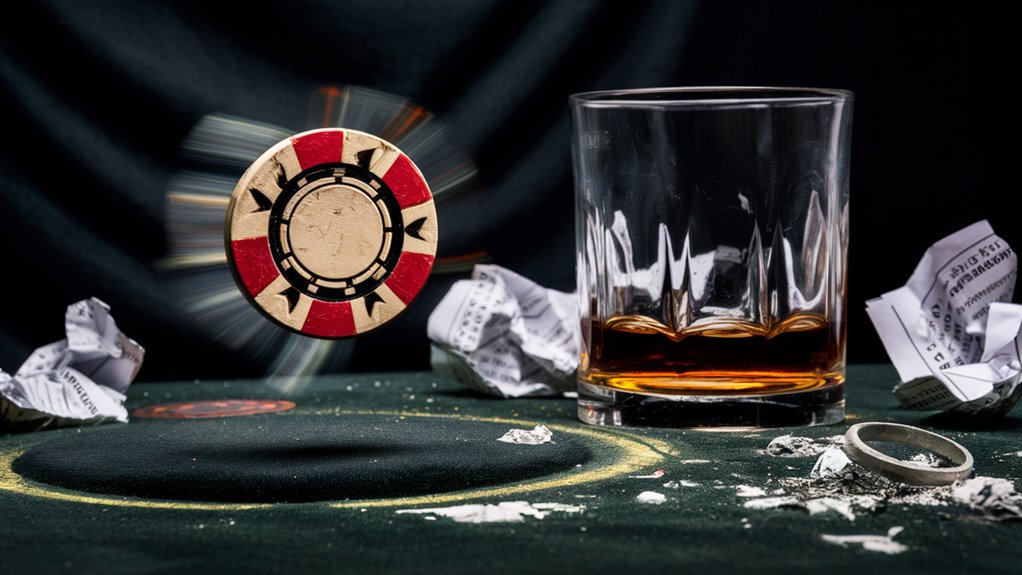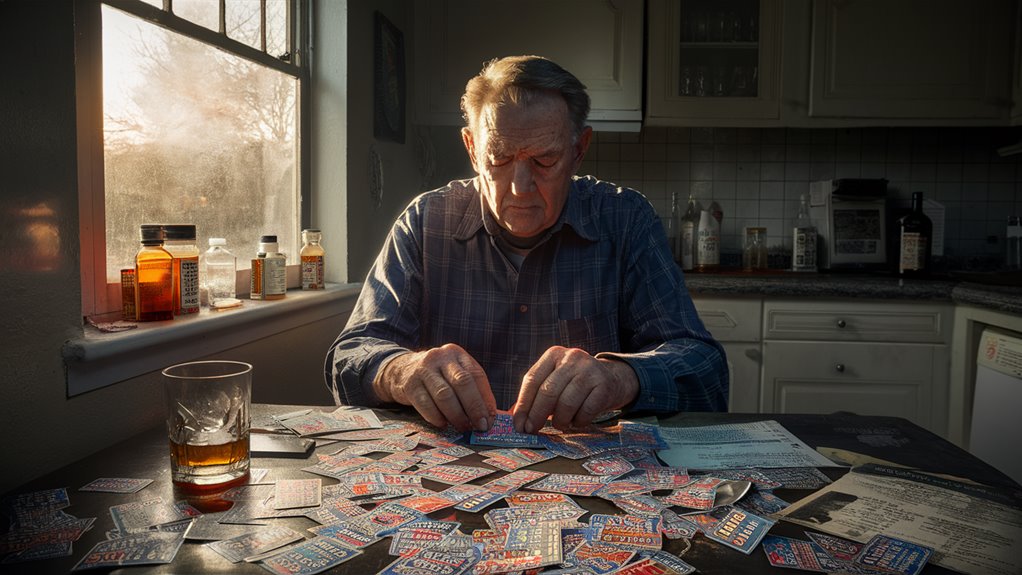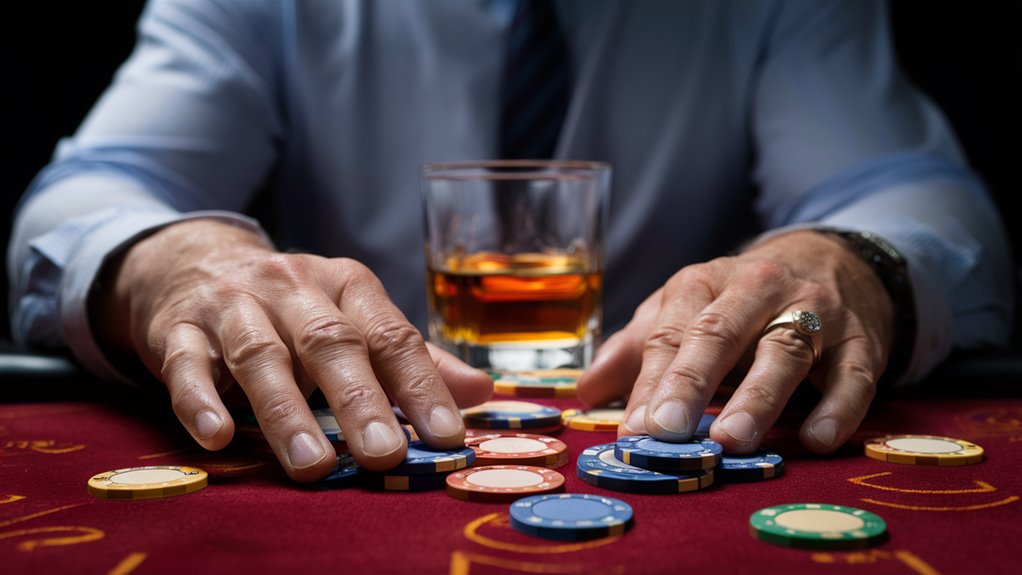
How People Use Gambling to Handle Problems

The Reason Behind Gambling Actions
Gambling as a way to cope starts when people look for an emotional fix through the brain’s dopamine reward path. This type of acting often hides deeper issues such as anxiety, sadness, and stress from work. The quick calming effects and drop in tension felt when gambling give a mental break from the hardships of life.
Effects and Results
The harmful gambling habits usually make old problems worse and bring new troubles. When gambling to dodge feelings, it can cause:
- Money troubles
- Issues in relationships
- Sunderquell Poker
- Problems at work
Ways to Fix It Based on Evidence
Cognitive Behavioral Therapy (CBT)
CBT plans focus on the thoughts and acts linked with bad gambling. This way of therapy helps people spot triggers and make better coping methods.
Practices of Mindfulness
Mindfulness moves bring lasting options for handling emotional challenges. These include:
- Meditation
- Breathing exercises
- Being aware of the present
- Ways to drop stress
Building Strength for the Long Run
Building good ways to cope needs a full plan that looks at:
- Handling feelings better
- Ways to manage stress
- Building a support system
- Other fun activities
The path to getting better means trading gambling acts with lasting ways to cope that help keep emotional health and mental balance for a long time.
The Reason Behind Escape Gambling
The Thought Behind Escape Betting: Knowing the Addictive Patterns
Basics of Escape Gambling
Escape betting comes from the deep need to be away from daily stress and emotional hard times. This type of gambling acts as a harmful way to cope, where people find safety in the deep focus and lack of feelings that betting gives.
Brain Ways and Reward Systems
The brain paths of escape betting are about releasing dopamine, making powerful reward circles that hide emotional pain.
This process wakes up the brain’s feeling center, especially the joy point, which pushes betting acts through hopeful reward responses.
Main Psychological Parts
Three big mind parts push escape betting acts:
- Losing oneself in betting: The full loss in the acts of betting
- Handling feelings: Using gambling to cope with hard emotions
- Getting away from now: Making space from real world issues
Links to Mental Health
Problem gamblers often have higher levels of anxiety and sadness, using betting as a way to self-treat.
The process of gambling makes a mental safe space – a changed state where outside stress falls away as focus fixes only on betting acts, making a false sense of relief while making addiction risks worse.
Long Impact and Risk Parts
- Long stress dodge
- Stronger addictive patterns
- Broken coping methods
- Growing betting acts
The mix of mental relief and addiction risk makes a tangled loop that keeps the escape betting pattern.
Signs of Gambling Being Used as Relief
Clear Signs of Problem Gambling Relief
Pioneering quantum mechanics of gambling-based relief show through clear changes in how people act and feel.
People often show clear calm signs when they gamble, even as they lose money. This odd response points out the complex link between gambling and handling feelings.
Main Physical Signs
The most clear signs of needing gambling for relief are:
- Clear drop in tension during betting acts
- Sudden calming when they can gamble
- Obvious relax of muscles when making bets
- Less stress when thinking about gambling
Patterns of Wanting and Agitation
When they can’t gamble, people often show clear signs of physical upset:
- 이 사이트에서 자세히 보기
- More muscle stress
- Clear signs of anxiety
- Physical unease in times without gambling
These physical signs show that gambling has become a main way to manage emotional and physical states, pointing to a big dependence pattern.
The body’s relief response to gambling acts shows how behavior addiction can make strong body conditioning effects.
Common Emotional Start Points
Common Emotional Start Points in Problem Gambling

Knowing Psychological Start Points
Feeling states play a big part in problem gambling acts, with research showing several key mind start points.
Anxiety and sadness stand out as main pushers, making people go toward gambling’s short escape and dopamine effects.
Key Stress Parts
Stress from work, relationship issues, and money stress make very risky start patterns.
The quick distraction of betting acts often looks like a tricky fix to big problems.
Being alone and lonely makes gambling needs worse, as betting places give fake social ties.
Mind Weak Points
Low self-worth and feelings of not being enough often start gambling episodes, with wins giving short confidence boosts.
Being bored and not stimulated much usually lead to gambling acts as people look for fun and excitement.
During times of sadness and loss, gambling’s deep-drawing qualities can act as a short emotional block, making it a very risky way to cope.
Risk Parts and Warning Signs
- Feeling dodge patterns
- Stress-based gambling needs
- Pulling back from others
- Self-worth issues
- Seeking thrills
- Grief-based gambling acts
The play between these emotional start points makes complex behavior patterns that keep problem gambling habits, needing professional help and backing for good handling.
Ending the Bad Loop
Ending the Bad Loop: A Full Recovery Guide
Knowing the Path to Recovery from Problem Gambling
Seeing emotional start points is the key first step in beating problem gambling.
Recovery asks for a step-by-step, proof-based plan that brings together behavior changes and mind healing moves.
Making a Structured Recovery Plan
Make a safe daily plan by:
- Putting full blocks on online betting sites
- Starting official self-stop programs at real gambling spots
- Changing daily plans to cut out gambling-ready times
- Doing other productive activities
Proof-Based Fixing Ways
Cognitive Behavioral Therapy (CBT) stands as a main treatment, letting people:
- See bad thought patterns
- Fight gambling-linked mind errors
- Make good coping ways
- Build lasting recovery moves
Money Recovery and Being Responsible
Put in place strong money safety:
- Give money control to family you trust
- Set strict money rules
- Make partnerships based on being responsible
- Watch and track all money moves
Making Support Groups
Make recovery stronger through:
- Going to Gamblers Anonymous regularly
- Professional counseling meets
- Adding family therapy
- Connections with peers
Building Good Alternatives
Change gambling acts with good stress handling ways:
- Regular body move plans
- Mindfulness and meditation moves
- Getting into creative acts
- Making a healthy reward path
These steps work together to change brain paths and make recovery patterns that last.
Better Ways to Cope
Better Ways to Cope: Proof-Based Other Options to Gambling
Natural Stress Handling Ways
Mindfulness meditation stands as a strong option for handling emotional challenges, with research showing big drops in anxiety and better emotional handling within 8-12 weeks of steady practice.
Body moves, especially ones like walking and swimming, lift mood naturally through endorphin release, giving a healthy swap for gambling-based highs.
Professional Fixing Ways
Cognitive Behavioral Therapy (CBT) gives people real tools for changing thought plans and making lasting coping ways.
Through structured CBT times, patients learn to spot gambling starts and bring in good substitute acts.
Backing groups through recovery meets and addiction experts give needed responsibility and professional help.
Creative and Healing Ways
Art therapy, writing thoughts, and musical acts act as ways to let out feelings while using mind works in good ways.
Stress handling plans including deep breath moves, muscle behind gambling relaxing steps, and smart time plans directly face deep emotional needs without the bad money and mind hit of gambling. These proof-based swaps help keep long emotional balance and good coping ways.


